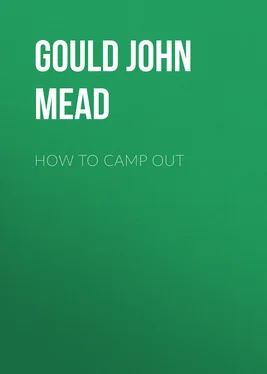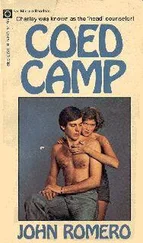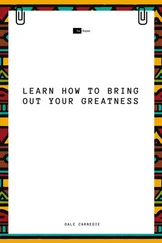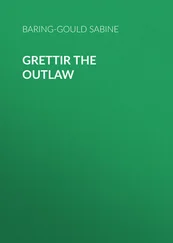John Gould - How to Camp Out
Здесь есть возможность читать онлайн «John Gould - How to Camp Out» — ознакомительный отрывок электронной книги совершенно бесплатно, а после прочтения отрывка купить полную версию. В некоторых случаях можно слушать аудио, скачать через торрент в формате fb2 и присутствует краткое содержание. Жанр: Хобби и ремесла, foreign_home, Биология, на английском языке. Описание произведения, (предисловие) а так же отзывы посетителей доступны на портале библиотеки ЛибКат.
- Название:How to Camp Out
- Автор:
- Жанр:
- Год:неизвестен
- ISBN:нет данных
- Рейтинг книги:4 / 5. Голосов: 1
-
Избранное:Добавить в избранное
- Отзывы:
-
Ваша оценка:
- 80
- 1
- 2
- 3
- 4
- 5
How to Camp Out: краткое содержание, описание и аннотация
Предлагаем к чтению аннотацию, описание, краткое содержание или предисловие (зависит от того, что написал сам автор книги «How to Camp Out»). Если вы не нашли необходимую информацию о книге — напишите в комментариях, мы постараемся отыскать её.
How to Camp Out — читать онлайн ознакомительный отрывок
Ниже представлен текст книги, разбитый по страницам. Система сохранения места последней прочитанной страницы, позволяет с удобством читать онлайн бесплатно книгу «How to Camp Out», без необходимости каждый раз заново искать на чём Вы остановились. Поставьте закладку, и сможете в любой момент перейти на страницу, на которой закончили чтение.
Интервал:
Закладка:
John Mead Gould
How to Camp Out
PREFACE
In these few pages I have tried to prepare something about camping and walking, such as I should have enjoyed reading when I was a boy; and, with this thought in my mind, I some years ago began to collect the subject-matter for a book of this kind, by jotting down all questions about camping, &c., that my young friends asked me. I have also taken pains, when I have been off on a walk, or have been camping, to notice the parties of campers and trampers that I have chanced to meet, and have made a note of their failures or success. The experiences of the pleasant days when, in my teens, I climbed the mountains of Oxford County, or sailed through Casco Bay, have added largely to the stock of notes; and finally the diaries of "the war," and the recollections of "the field," have contributed generously; so that, with quotations, and some help from other sources, a sizable volume is ready.
Although it is prepared for young men,—for students more especially,—it contains much, I trust, that will prove valuable to campers-out in general.
I am under obligations to Dr. Elliott Coues, of the United States Army, for the valuable advice contained in Chapter XIII.; and I esteem it a piece of good fortune that his excellent work ("Field Ornithology") should have been published before this effort of mine, for I hardly know where else I could have found the information with authority so unquestionable.
Prof. Edward S. Morse has increased the debt of gratitude I already owe him, by taking his precious time to draw my illustrations, and prepare them for the engraver.
Mr. J. Edward Fickett of Portland, a sailmaker, and formerly of the navy, has assisted in the chapter upon tents; and there are numbers of my young friends who will recognize the results of their experience, as they read these pages, and will please to receive my thanks for making them known to me.
Portland, Me., January, 1877.
CHAPTER I
GETTING READY
The hope of camping out that comes over one in early spring, the laying of plans and arranging of details, is, I sometimes think, even more enjoyable than reality itself. As there is pleasure in this, let me advise you to give a practical turn to your anticipations.
Think over and decide whether you will walk, go horseback, sail, camp out in one place, or what you will do; then learn what you can of the route you propose to go over, or the ground where you intend to camp for the season. If you think of moving through or camping in places unknown to you, it is important to learn whether you can buy provisions and get lodgings along your route. See some one, if you can, who has been where you think of going, and put down in a note-book all he tells you that is important.
Have your clothes made or mended as soon as you decide what you will need: the earlier you begin, the less you will be hurried at the last.
You will find it is a good plan, as fast as you think of a thing that you want to take, to note it on your memorandum; and, in order to avoid delay or haste, to cast your eyes over the list occasionally to see that the work of preparation is going on properly. It is a good plan to collect all of your baggage into one place as fast as it is ready; for if it is scattered you are apt to lose sight of some of it, and start without it.
As fast as you get your things ready, mark your name on them: mark every thing. You can easily cut a stencil-plate out of an old postal card, and mark with a common shoe-blacking brush such articles as tents, poles, boxes, firkins, barrels, coverings, and bags.
Some railroads will not check barrels, bags, or bundles, nor take them on passenger trains. Inquire beforehand, and send your baggage ahead if the road will not take it on your train.
Estimate the expenses of your trip, and take more money than your estimate. Carry also an abundance of small change.
Do not be in a hurry to spend money on new inventions. Every year there is put upon the market some patent knapsack, folding stove, cooking-utensil, or camp trunk and cot combined; and there are always for sale patent knives, forks, and spoons all in one, drinking-cups, folding portfolios, and marvels of tools. Let them all alone: carry your pocket-knife, and if you can take more let it be a sheath or butcher knife and a common case-knife.
Take iron or cheap metal spoons.
Do not attempt to carry crockery or glassware upon a march.
A common tin cup is as good as any thing you can take to drink from; and you will find it best to carry it so that it can be used easily. 1 1 If your haversack-flap has a strap which buckles down upon the front, you can run the strap through the cup-handle before buckling; or you can buy a rein-hitch at the saddlery-hardware shop, and fasten it wherever most convenient to carry the cup.
Take nothing nice into camp, expecting to keep it so: it is almost impossible to keep things out of the dirt, dew, rain, dust, or sweat, and from being broken or bruised.
Many young men, before starting on their summer vacation, think that the barber must give their hair a "fighting-cut;" but it is not best to shave the head so closely, as it is then too much exposed to the sun, flies, and mosquitoes. A moderately short cut to the hair, however, is advisable for comfort and cleanliness.
If you are going to travel where you have never been before, begin early to study your map. It is of great importance, you will find, to learn all you can of the neighborhood where you are going, and to fix it in your mind.
So many things must be done at the last moment, that it is best to do what you can beforehand; but try to do nothing that may have to be undone.
Wear what you please if it be comfortable and durable: do not mind what people say. When you are camping you have a right to be independent.
If you are going on a walking-party, one of the best things you can do is to "train" a week or more before starting, by taking long walks in the open air.
Finally, leave your business in such shape that it will not call you back; and do not carry off keys, &c., which others must have; nor neglect to see the dentist about the tooth that usually aches when you most want it to keep quiet.
For convenience the following list is inserted here. It is condensed from a number of notes made for trips of all sorts, except boating and horseback-riding. It is by no means exhaustive, yet there are very many more things named than you can possibly use to advantage upon any one tour. Be careful not to be led astray by it into overloading yourself, or filling your camp with useless luggage. Be sure to remember this.
Ammon'd opodeldoc.
Axe (in cover).
Axle-grease.
Bacon.
Barometer (pocket).
Bean-pot.
Beans (in bag).
Beef (dried).
Beeswax.
Bible.
Blacking and brush.
Blankets.
Boxes.
Bread for lunch.
Brogans (oiled).
Broom.
Butter-dish and cover.
Canned goods.
Chalk.
Cheese.
Clothes-brush.
Cod-line.
Coffee and pot.
Comb.
Compass.
Condensed milk.
Cups.
Currycomb.
Dates.
Dippers.
Dishes.
Dish-towels.
Drawers.
Dried fruits.
Dutch oven.
Envelopes.
Figs.
Firkin (see p. 48 Конец ознакомительного фрагмента. Текст предоставлен ООО «ЛитРес». Прочитайте эту книгу целиком, купив полную легальную версию на ЛитРес. Безопасно оплатить книгу можно банковской картой Visa, MasterCard, Maestro, со счета мобильного телефона, с платежного терминала, в салоне МТС или Связной, через PayPal, WebMoney, Яндекс.Деньги, QIWI Кошелек, бонусными картами или другим удобным Вам способом.
).
Интервал:
Закладка:
Похожие книги на «How to Camp Out»
Представляем Вашему вниманию похожие книги на «How to Camp Out» списком для выбора. Мы отобрали схожую по названию и смыслу литературу в надежде предоставить читателям больше вариантов отыскать новые, интересные, ещё непрочитанные произведения.
Обсуждение, отзывы о книге «How to Camp Out» и просто собственные мнения читателей. Оставьте ваши комментарии, напишите, что Вы думаете о произведении, его смысле или главных героях. Укажите что конкретно понравилось, а что нет, и почему Вы так считаете.











